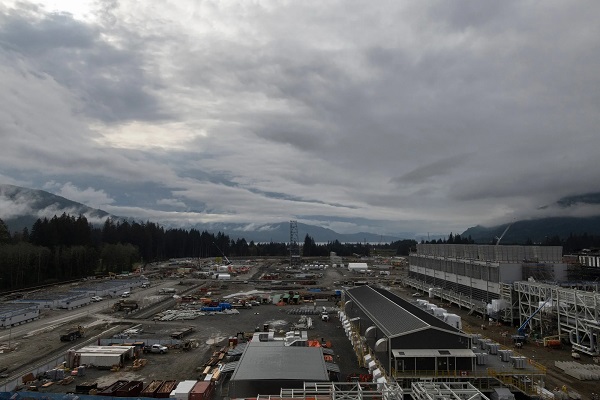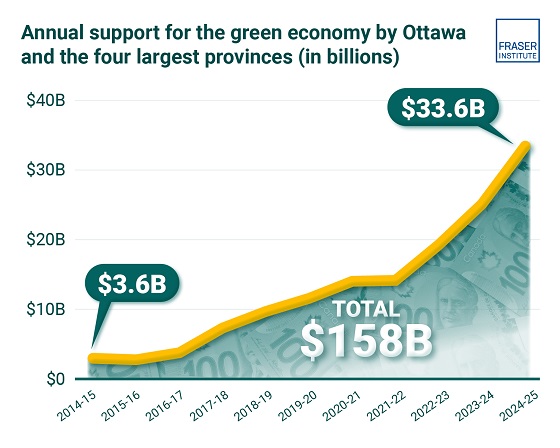Business
BC voters ditching climate crisis for promise to unlock natural resource development

From Energy Now
The LNG Canada facility under construction in Kitimat, British Columbia
Climate Goals Face B.C. Election Backlash in Home of Greenpeace – B.C. Conservatives Have Upended Race With Focus on Unlocking Natural Resource Development
An unlikely political upstart in Canada’s third-largest province, expelled from his previous party for climate science skepticism, is within striking distance of winning power with promises to ditch environmental targets and unleash natural-resources development.
The surge in support for John Rustad’s Conservative Party of British Columbia ahead of the Oct. 19 election may have been helped by the popularity of the unaffiliated federal Conservatives. Victory would add to the roster of right-leaning premiers at odds with Prime Minister Justin Trudeau’s Liberal government in Ottawa.
A Conservative government in BC might mark a bigger shift than anywhere else in the country. The province is famous for environmentalism — Vancouver is the birthplace of Greenpeace and home to Canada’s most famous climate activist, David Suzuki. David Eby, the current premier, unsuccessfully opposed the expansion of the Trans Mountain oil pipeline, and back in 2008 the province brought in one of North America’s first carbon taxes.
Although polls favor Eby’s left-leaning New Democratic Party, it’s close, and a spread between pollsters suggests the result remains unpredictable.
The public has endured inflation and strained local services, slower growth in an economy dragged by higher interest rates and lower exports, and a government that’s gone from surplus to a record C$9 billion ($6.5 billion) deficit. British Columbia, once rated AAA by S&P Global Ratings, has suffered three credit rating downgrades in three years.
Conservatives Have Surged in BC Polls
British Columbia’s Conservatives vault official opposition in election surprise
The ruling NDP — whose origins lie in labor unions — is parrying criticism of its own mixed seven-year record in office. It’s running on blunting the cost of living with subsidies, tying the minimum wage to inflation, taxing home speculation, blocking Airbnb Inc.-style short-term rentals and using hydrocarbon revenues for a “clean economy transition fund.”
Rustad’s rise is also a stunning tale of revenge. The longtime representative of Nechako Lakes — a district 600 miles north of Vancouver in BC’s deep interior — was kicked out of the BC Liberal Party in 2022 on his birthday after sharing a social media post questioning carbon dioxide’s effect on the climate. He took over the BC Conservative Party, then a marginal force in provincial politics. Before long it had leapfrogged his old party in the polls.
Acrimonious talks to merge the two groups failed, and by August the previously formidable Liberals — which had rebranded as BC United — gave up, withdrawing from the election in an effort to unite voters against the NDP.
Unlocking Natural Resources
In an interview with Bloomberg, Rustad said he won’t cut social, health or education spending — a majority of the budget. He’s also promising tax cuts and plans to deepen the deficit to more than C$10 billion in his first year.
His plan to balance BC’s budget over eight years is based on an optimistic 5.4% average GDP growth rate to 2030 — more than double the average rate of the past five years — fueled by axing CleanBC, the NDP plan to cut BC’s emissions 40% by 2030. Rustad said that would save as much as C$2.5 billion in government spending, then bring in billions in extra revenue by unlocking industrial projects.
Foremost among them is LNG Canada, a new liquefied natural gas project in the remote north that the federal government said may be worth C$40 billion — possibly the largest private investment in the country’s history. There’s a plan to double its size, but it’s proving tricky to power with BC’s zero-emission hydroelectricity instead of fossil fuels, because it would need a new transmission line, with one previous cost estimate at C$3 billion.
Not a problem if looser rules let them burn gas.
“In British Columbia, we could stop everything we do, and by next year the increases from China and India will swamp anything that we’ve done,” Rustad told Bloomberg. “So my perspective is we need to make sure we’re looking after people. And so for a changing climate, we need to be able to adapt to it.”
When he appeared on climate-skeptic Canadian influencer Jordan Peterson’s podcast, Rustad said: “How is it that we’ve convinced carbon-based beings that carbon is a problem?”
Rustad also talked up billions in extra revenue from streamlining mine permits — one of BC’s oldest industries and more prominent in the remoter parts of the province he hails from.
Asked about BC’s rural vote, Rustad says: “There’s no question, the NDP completely ignored it.”
Rustad also wants to ditch BC’s carbon tax to cut costs for businesses and consumers. That’s also the top rallying cry for federal Conservatives, who are trying to force a “carbon tax election” to topple Trudeau. Provincial carbon taxes are federally back-stopped, so to banish the tax Rustad would need the Conservative Party of Canada to take power.
“The top-of-mind issues that people are frustrated about are inflation and the cost of living, housing and health care,” Kathryn Harrison, a political science professor at the University of British Columbia, said in an interview. “And what we’ve seen is that the federal Conservative Leader Pierre Poilievre has been able to connect those public concerns with the carbon tax. It’s given them something that they can focus their frustrations on.”
Even the climate-conscious NDP has pivoted away from defending the carbon tax to pledging they would repeal it for consumers — but unlike the Conservatives, they would shift the burden to corporate “polluters.”
In his plan to speed up business, Rustad has also taken issue with BC’s Declaration on the Rights of Indigenous Peoples Act because it causes “friction”. It requires government to seek Indigenous people’s “free, prior and informed consent” to implement measures that may affect BC’s more than 200 Indigenous communities.
Rustad’s Conservatives include Indigenous candidates, and he talks about supporting economic reconciliation — the material, financial side of redressing Canada’s colonial injustices. But some First Nations leaders have called his platform “dangerous” for pitting British Columbians against each other.
Relentless Controversies
Rustad’s biggest weak point may be the controversial things said my members of his team, leading to relentless stories since they’ve been thrust into the spotlight.
Despite his dry, phlegmatic style, the same goes for Rustad himself. He’s said he regretted getting the “so-called” Covid-19 vaccine, and a clip showed him seeming to go along with an activist’s concept of “Nuremberg 2.0” — trials for officials who oversaw pandemic health measures. Rustad apologized and said he “misunderstood” the question.
Rival party staffers gave out BC Conservative-branded tinfoil hats after a candidate’s shared posts described 5G wireless signals as a weapon, according to local media. She was ousted, but another candidate who claimed vaccines can cause a type of AIDS remains part of the caucus.
Another apologized last week for posts including one in 2015 calling Palestinians “inbred walking, talking, breathing time bombs.”
In communities like Metro Vancouver, some of the most diverse in North America, that kind of thing may jeopardize Rustad’s path to power.
But Rustad is also being cheered on by what Harrison described as an “accidental collection of voters who share frustration with the cost of living, the cost of housing, emergency room closures” — which could span from suburban families who judge the economy isn’t working for them to BC’s wealthiest, including billionaire Lululemon Athletica Inc founder Chip Wilson.
If Rustad pulls it off, his unorthodox strategy to turn one of Canada’s progressive strongholds conservative will reverberate with those fighting federal politics in the nation’s capital 3,000 miles away.
Business
You Won’t Believe What Canada’s Embassy in Brazil Has Been Up To

Canada’s embassy in Brazil has been having a terrific year. Well, at least that’s how it might look from the perspective of the 15 or so Canadians who live and work there.
Oh sure, they just faced a conviction in a local court over labour law infractions. And, OK, there are also multiple related cases pending. But the vibe down there must be great.
The Audit is a reader-supported publication.
To receive new posts and support my work, consider becoming a free or paid subscriber.
After all, it never snows in Brasilia and, not counting a half million Canadian dollars for security and “common services”, they spent $1.1 million keeping their various properties running according to a 2024-2025 budget document I’ve seen. Here, courtesy of Google Satellite, is what the embassy itself looks like:
And here’s how that $1.1 million in spending broke down:
To be sure, this isn’t a story about vast crooked fortunes being gained through devious financial scams. I’m aware of no 300ft luxury yachts being quietly moved between Dows Lake and the Bahamas each fall and spring. And it’s certainly reasonable for Canadians on foreign missions to expect to enjoy an above-average lifestyle while serving their country abroad.
But perhaps some of the spending here is getting a bit too close to the line. Take the ten pool covers purchased last year for nearly $25,000 (Canadian) in total. The budget document actually notes how such covers can help with the high cost of replacing water lost through evaporation.
In fact, water costs (totaling $103,000 that year) have been rising: they’re 20 percent higher than fiscal year 2022-2023. So it does seem that someone on staff is aware of the problem and is trying to address it. But a simpler solution might involve just shutting down at least some of the pools (there’s no way they need 10 covers for just one pool) or switching to using trucked-in water for the pools (which is supposed to be cheaper).
And how about the $16,900 spent on a Rational iCombi Pro Xs 6 2/3 220V Mono Elétrico oven for the official residence? Nice. But that’s around ten times the cost of a standard high-end home oven. Add to that the $2,140 spent on a KitchenAid 6.6L, Espresso Machine, Pasta Maker, Blender, and Electrical Slicer.
Don’t you just hate it when everything breaks down at the same time?
I realize that, in the grand scheme of things, nothing here feels all that evil. And I know it’s not fair to peer over people’s shoulders and judge their actions from such a distance. But it certainly does look like here’s yet one more Global Affairs Canada operation that’s missed the memo on the need to tone down public spending.
The Audit is a reader-supported publication.
To receive new posts and support my work, consider becoming a free or paid subscriber.
Automotive
Carney’s Budget Risks Another Costly EV Bet

From the Frontier Centre for Public Policy
GM’s Ontario EV plant was sold as a green success story. Instead it collapsed under subsidies, layoffs and unsold vans
Every age invents new names for old mistakes. In ours, they’re sold as investments. Before the Carney government unveils its November budget promising another future paid for in advance, Canadians should remember Ingersoll, Ont., one of the last places a prime minister tried to buy tomorrow.
Eager to transform the economy, in December 2022, former prime minister Justin Trudeau promised that government backing would help General Motors turn its Ingersoll plant into a beacon of green industry. “By 2025 it will be producing 50,000 electric vehicles per year,” he declared: 137 vehicles daily, six every hour. What sounded like renewal became an expensive demonstration of how progressive governments peddle rampant spending as sound strategy.
The plan began with $259 million from Ottawa and another $259 million from Ontario: over half a billion to switch from Equinox production to BrightDrop electric delivery vans. The promise was thousands of “good, middle-class jobs.”
The assembly plant employed 2,000 workers before retooling. Today, fewer than 700 remain; a two-thirds collapse. With $518 million in public funds and only 3,500 vans built in 2024, taxpayers paid $148,000 per vehicle. The subsidy works out to over half a million dollars per remaining worker. Two out of every three employees from Trudeau’s photo-op are now unemployed.
The failure was entirely predictable. Demand for EVs never met the government’s plan. Parking lots filled with unsold inventory. GM did the rational thing: slowed production, cut staff and left. The Canadian taxpayer was left to pay the bill.
This reveals the weakness of Ottawa’s industrial policy. Instead of creating conditions for enterprise, such as reliable energy, stable regulation, and moderate taxes, progressive governments spend to gain applause. They judge success by the number of jobs announced, yet those jobs vanish once the cameras leave.
Politicians keep writing cheques to industry. Each administration claims to be more strategic, yet the pattern persists. No country ever bought its way into competitiveness.
Trudeau “bet big on electric vehicles,” but betting with other people’s money isn’t vision; it’s gambling. The wager wasn’t on technology but narrative, the naive idea that moral intention could replace market reality. The result? Fewer jobs, unwanted products and claims of success that convinced no one.
Prime Minister Mark Carney has mastered the same rhetorical sleight of hand. Spending becomes “investment,” programs become “platforms.” He promises to “catalyze unprecedented investments” while announcing fiscal restraint: investing more while spending less. His $13-billion federal housing agency is billed as a future investment, though it’s immediate public spending under a moral banner.
“We can build big. Build bold. Build now,” Carney declared, promising infrastructure to “reduce our vulnerabilities.” The cadence of certainty masks the absence of limits. Announcing “investment” becomes synonymous with action itself; ambition replaces accountability.
The structure mirrors the Ingersoll case: promise vast returns from state-directed spending, redefine subsidy as vision, rely on tomorrow to conceal today’s bill. “Investment” has become the language of evasion, entitlement and false pride.
As Carney prepares his first budget, Canadians should remember what happened when their last leader tried to buy a future with lavish “investment.”
A free economy doesn’t need bribery to breathe. It requires the discipline of risk and liberty to fail without dragging a country down. Ingersoll wasn’t undone by technology but by ideological conceit. Prosperity cannot be decreed and markets cannot be commanded into obedience.
Every age invents new names for old mistakes. Ours keeps making the same ones. Entitled hubris knows no bounds.
Marco Navarro-Genie is vice-president of research at the Frontier Centre for Public Policy and co-author, with Barry Cooper, of Canada’s COVID: The Story of a Pandemic Moral Panic (2023).
-

 Alberta24 hours ago
Alberta24 hours agoFrom Underdog to Top Broodmare
-

 Media2 days ago
Media2 days agoCarney speech highlights how easily newsrooms are played by politicians
-

 Business1 day ago
Business1 day agoPaying for Trudeau’s EV Gamble: Ottawa Bought Jobs That Disappeared
-

 Business1 day ago
Business1 day agoCBC uses tax dollars to hire more bureaucrats, fewer journalists
-

 National1 day ago
National1 day agoElection Officials Warn MPs: Canada’s Ballot System Is Being Exploited
-

 Economy21 hours ago
Economy21 hours agoIn his own words: Stunning Climate Change pivot from Bill Gates. Poverty and disease should be top concern.
-

 Addictions23 hours ago
Addictions23 hours agoThe Shaky Science Behind Harm Reduction and Pediatric Gender Medicine
-

 Business22 hours ago
Business22 hours agoClean energy transition price tag over $150 billion and climbing, with very little to show for it








